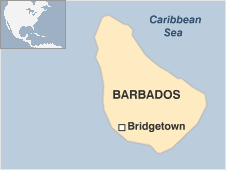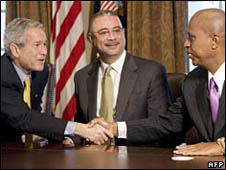 |
The eastern Caribbean nation of Barbados has seen tourism overtake the export of sugar as its main revenue earner.
Known for its beaches and cricket - its national sport - the former British colony has a dual heritage: English - evident in its stone-built Anglican churches and Saturday race meetings - and African reflected in its music and dance.
Overview
Barbados is one of the more populous and prosperous Caribbean islands. Political economic and social stability have given it one of the highest standards of living in the developing world.
It is a centre for financial services and has offshore reserves of oil and natural gas.
In recent years a construction boom has taken hold with new hotels and housing complexes springing up. The trend accelerated as the island prepared to host some of the key Cricket World Cup matches in 2007.
However a shortage of jobs has prompted many Barbadians - more often known as Bajans - to find work abroad. The money that they send home is an important source of income.
Most Barbadians are the descendants of African slaves who were brought to the island from the 17th century to work the sugar cane plantations.
Limestone caverns coral reefs and a warm climate tempered by trade winds are among the island's natural assets. Barbados is relatively flat with highlands in the interior.
Facts
- Full name: Barbados
- Population: 256000 (UN 2009)
- Capital: Bridgetown
- Area: 430 sq km (166 sq miles)
- Major language: English (Bajan an English-African dialect is widely used)
- Major religion: Christianity
- Life expectancy: 74 years (men) 80 years (women) (UN)
- Monetary unit: 1 Barbadian dollar = 100 cents
- Main exports: Sugar and molasses rum other foods and beverages chemicals electrical components clothing
- GNI per capita: US$9260 (World Bank 2005)
- Internet domain: .bb
- International dialling code: +1246
Leaders
Head of state: Queen Elizabeth II represented by a governor-general.
Prime minister: David Thompson
Elections in mid-January 2008 saw former junior finance minister David Thompson and his Democratic Labour Party win 20 of the 30 seats in parliament.

David Thompson (centre) meets US President George Bush in March 2008
|
Mr Thompson ousted Owen Arthur of the Barbados Labour Party who had been prime minister for three terms since 1994.
The top issues for voters were the high cost of living in Barbados and the affordability of housing. Health care and transport infrastructure also featured.
Mr Thompson has called for unity after an unusually bitter campaign.
Barbados has a two-house parliament comprising the directly-elected House of Assembly and the Senate.
Media
Barbadians enjoy full freedom of expression. This is reflected in the media which is free of censorship and state control and often criticises the government.
All newspapers are privately-owned and there is a mix of private and public radio stations.
Although the country's sole television station is run by the government-owned Caribbean Broadcasting Corporation it presents a wide range of political views. The CBC also operates MCTV a multi-channel and pay-TV service.
The press
- Barbados Advocate - daily
- The Nation - daily
- Caribbean Week - fortnightly
- Broad Street Journal - business
Television
- Caribbean Broadcasting Corporation (CBC) - government-owned operates CBC TV
Radio
- Caribbean Broadcasting Corporation (CBC) - government-owned operates CBC Radio 900 AM The One 98.1 Quality 100.7
- BBS FM - commercial operated by Barbados Broadcasting Service
- Faith 102 - religious run by Barbados Broadcasting Service
- Hott 95.3 - commercial run by Starcom Network
- Voice of Barbados - commercial FM run by Starcom Network
- Love 104.1 - commercial run by Starcom Network
- Gospel 97.5 FM - run by Starcom Network
- Mix 96.9 - commercial
News agency
-
Caribbean News Agency (Cana) - funded by public private shareholders in English-speaking Caribbean
AFRICA | ASIA-PACIFIC | AMERICAS | EUROPE | MIDDLEEAST | SOUTHASIA
Mauritania Mauritius Morocco Mozambique Namibia Niger Nigeria Republic-of-congo Rwanda Sao-tome-and-principe Senegal Seychelles Sierra-leone Somalia South-africa Sudan Swaziland Tanzania The-gambia Togo Tunisia Uganda zambia Zimbabwe Australia Brunei Burma Cambodia China East-timor Fiji Indonesia Japan Kazakhstan Kiribati Kyrgyzstan Laos Malaysia Marshall-islands Micronesia Mongolia Nauru New-zealand North-korea Palau Papua-new-guinea Samoa Singapore Solomon-islands South-korea Taiwan Tajikistan Thailand The-philippines Tonga Turkmenistan Tuvalu Uzbekistan Vanuatu Vietnam Antigua-and-barbuda Argentina Bahamas Barbados Belize Bolivia Brazil Canada Chile Colombia Costa-rica Cuba Dominica Dominican-republic Ecuador El-salvador Grenada Guatemala GuyanaHaiti Honduras Jamaica Mexico Nicaragua Panama Paraguay Peru St-kitts-and-nevis St-lucia St-vincent-and-the-grenadines Suriname Trinidad-and-tobago United-states-of-america Uruguay Venezuela Albania Andorra Armenia Austria Azerbaijan Belarus Belgium Bosnia-hercegovina Bulgaria Croatia Cyprus Czech-republic Denmark Estonia Finland France Georgia Germany Greece Hungary Iceland Ireland Italy Latvia Liechtenstein Lithuania Luxembourg Macedonia Malta Moldova Monaco Montenegro Norway Poland Portugal Russia San-marino Serbia Slovakia Slovenia Spain Sweden Switzerland The-netherlands Turkey Ukraine United-kingdom Vatican Algeria Egypt Iran Iraq Israel-and-palestinian-territories Jordan Kuwait Lebanon Libya Mauritania Oman Saudi-arabia Sudan Syria Tunisia United-arab-emirates Yemen Afghanistan Bangladesh Bhutan India Nepal Pakistan Sri-Lanka The-Maldives

